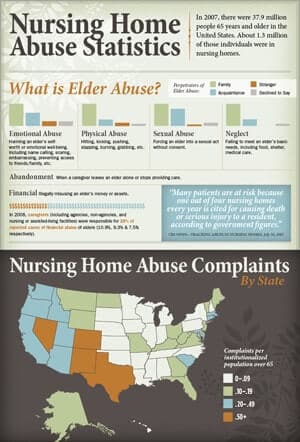Protecting Against Elder Financial Abuse
Elder abuse continues to be a problem in Colorado and throughout the United States. According to the Adult Protective Services Association, seniors are most likely to be financially exploited by someone they know and trust 1.
Protecting your loved one from financial abuse is a critical part of ensuring their safety and good health. However, it can be hard to know what to do to protect your loved one from exploitation. Our Denver attorneys for elder abuse help you understand how to protect elders from financial abuse.
Who Is Most Likely to Abuse the Elderly?
Trusted individuals are most likely to abuse the elderly. A person with close access to the senior like a family member, attorney, neighbors, clergy, or financial advisor may be a person with access and the opportunity to abuse a senior.
Although strangers can exploit the elderly, the people most likely to abuse the elderly are people who are close to them and who have access to them and their finances.
What Constitutes Financial Elder Abuse?
What constitutes financial elder abuse is the inappropriate use of an elder’s finances. It might be for personal gain, or it might simply be in a way that isn’t in the best interests of the elder. Any use of an elder’s finances that prevents the elder from using the funds for their own best interests constitutes financial elder abuse. Even a fiduciary who doesn’t use the funds for the best interests of the elder or who withholds funds can be responsible for financial elder abuse.
Protecting Elders From Financial Abuse
Here are some ways to protect elders from financial abuse:
Know the warning signs – When you’re protecting elders from financial abuse, it can be helpful to know the warning signs of abuse. Here are some warning signs of financial abuse:
- Depression; changes in mood
- Fast depletion of finances
- Expenditures that seem unnecessary or out of place
- A sudden lack of access to a senior’s finances
- Inability to meet the senior’s needs in the short term and the long term
- Distrust from the senior; questions about finances; anxiety
- Unusual account activity; large expenditures or a series of small expenses
- Reliance on public assistance when there should be sufficient finances to provide for the senior
- A fiduciary’s refusal to answer questions or allow access to records
Keep caregivers transparent and accountable – If one person has sole access to a senior’s accounts, the senior may be more susceptible to abuse than if multiple people are monitoring the accounts. Even if there’s one person appointed to make financial transactions on the senior’s behalf, it’s a good idea for the senior to monitor their own account or to have another person monitor the account on their behalf. Periodic audits can also ensure that the funds are being used in the senior’s best interests. Accountability and transparency are critical to prevent financial elder abuse.
Learn about common scams – There are several ways that people engage in financial abuse against seniors. While some scams seem obvious, they might not seem so obvious to a senior. A few common senior financial scams include:
- Charging large fees to be a financial advisor for the senior
- Miscellaneous charges and fees to manage finances that are in addition to standard fees
- Paying bills from a senior’s account that aren’t for the senior
- Conducting transactions in cash without a written record of spending; keeping change from cash transactions
- Getting a power of attorney as a guise to steal from the senior
- Threatening the senior or physically abusing them until they comply
Ask questions – If something seems out of place with a senior or their finances, it’s essential to trust your instincts. The sooner you get involved, the sooner you may be able to protect your loved one. When you suspect financial abuse of an elder, asking the right questions and getting more information can help you stop financial abuse in its tracks.
Contact law enforcement – Elder financial abuse is a crime. Law enforcement may help you take steps to protect your loved one and hold wrongdoers accountable. A case begins with making a police report. A police officer can take steps to investigate the abuse and help you determine if a criminal action is appropriate.
Contact an elder financial abuse attorney – Whether or not there’s a criminal action, an elder financial abuse attorney can help you take civil action. A civil action can be an effective way to stop elder financial abuse. You can also seek compensation for pain and suffering and for the money that the senior has lost. An elder financial abuse attorney knows what steps to take to investigate and gather records to prove the case. You can bring an action on your own; you don’t have to have approval from a police officer. A civil action for elder financial abuse provides accountability for financial abusers.
Tips For Avoiding Financial Abuse of Elders
Follow these helpful tips from the AARP and Colorado Attorney General to keep our seniors safe:
- Don’t be afraid to hang up the phone and never provide personal information such as a social security number, date of birth, bank account information, or credit card numbers.
- Be wary if the caller asks you to wire money or purchase a pre-paid payment card and never agree to payment in advance without a written offer that you can verify for authenticity.
- If the caller pretends to be a grandchild, ask them for personal information, such as the name of their siblings, to describe their parents, or to talk about the last time you spent with them. If they seem hurried and refuse to answer or answer incorrectly, this is a red flag.
- Report scams to local law enforcement, the local district attorney’s office or the attorney general’s office regardless of how small or insignificant the encounter may seem.
- When in doubt, investigate the company with your local Better Business Bureau before providing any personal information or payments.
How Do Seniors Protect Bank Accounts?
Seniors protect bank accounts by restricting access to only those who need access to provide care. They protect bank accounts by checking their accounts regularly for fraudulent or unauthorized activity, even on the part of caregivers.
For seniors who bank online, they should use strong passwords and avoid accessing their accounts on public internet networks. Seniors should never give out account information on the phone or over the internet.
Can You Go to Jail for Elder Abuse?
Yes, you can go to jail for elder abuse. All states have laws that prohibit elder abuse. The specific laws and potential penalties vary by state. However, all states have laws that prohibit the physical and financial abuse of elders. Jail or prison time is a possibility in all cases.
Contact Our Denver Attorneys for Elder Financial Abuse
Do you suspect elder financial abuse? Are you wondering how to help your loved one? At Bachus & Schanker, LLC, we’re attorneys who represent victims of elder abuse. We can help you investigate your loved one’s case and take the proper steps to protect them. Our attorneys represent victims in civil actions for compensation based on elder financial abuse. Contact us today for a friendly and confidential consultation with our legal team.
Sources
1 National Adult Protective Services Association. Elder Financial Exploitation. Retrieved 12 May 2021






